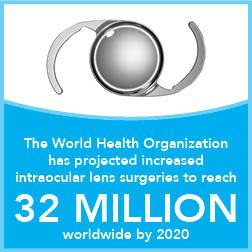You are not alone – your Cataract FAQ are likely the same frequently asked questions as numerous patients who have come through our doors and successfully made the choice of vision correcting surgery:
Is surgery the only option to treat a cataract?
Cataract surgery only becomes necessary if your cataracts have progressed to the point where you are not happy with your vision and are seeking an improvement. However, once you reach this point, surgery is currently the only option for effective treatment.
Does cataract surgery hurt?
Thanks to numbing drops and medications to help you relax, this procedure involves minimal discomfort. You may feel slight pressure during the procedure, but no sharp pain.
Will I be asleep during cataract surgery?
Since this procedure does not take very long, general anesthesia is not necessary, and you will be awake. Your surgeon will use a local/topical anesthetic to numb your eye and you will be given a mild sedative to calm you down.
Who performs the procedure, a surgeon or a technician?
One of our surgeons will perform the procedure. There will be a technician and nurse in the room to assist him.
I have cataracts in both eyes. Will the doctor treat both at the same time?
Typically, doctors will perform surgery in the second eye two or three weeks after the first eye. All patients are different, so talk to your surgeon about what is right for you.
How long before I can see after surgery?
Every patient and every eye is different, but patients commonly see well enough to drive the day after surgery.
How long until I can return to normal activities?
Most patients can resume normal basic activities like reading and watching TV by the next day, and return to work within two to seven days. Doctors typically recommend against any strenuous activity for two or more weeks. However, results vary for different patients, so you should ask your surgeon what is best for you.
How long will I be in the surgery center?
Patients commonly spend only a few hours at the surgery center and are allowed to go home the very same day.
Will I need to wear glasses after cataract surgery?
Most recipients of a traditional replacement lens will require glasses for certain activities. However, McDonald Eye Associates, located in Fayetteville and Rogers, Arkansas, offers several options that can reduce or even eliminate the need for glasses. For more information on our unique and innovative Continuous Vision option, click here. For information on our premium lens options, click here. Please keep in mind that there is an added fee for these treatments.
After surgery, will I be able to drive at night?
Your ability to drive at night should be much enhanced once your cataract is removed. Patients with the AcrySof® ReSTOR® IOL may notice a ring of light around headlights and other point-light sources, while recipients of ReZoom® may experience some glare at night and decreased near vision performance in dim light. These are typically mild, rarely bothersome, and tend to diminish with time.
Can my cataract come back?
Once a cataract has been removed it cannot return. However, over time, patients may complain that their vision has once again become cloudy. This is due to a condition, which may occur with any type of IOL, known as a secondary cataract or “PCO.” Secondary cataracts can be easily treated by a simple laser procedure performed in the office.
Are there any side effects? Anything I won’t like?
As with any surgical procedure, there are risks. There is a chance that you will experience halos or glare in your vision, but this is uncommon and usually goes away in time. With a standard IOL, you will likely require reading glasses. With the advanced ReSTOR® and ReZoom® lenses, you may experience less crispness at certain distances than at others, but this is usually mild, and most patients who receive these lenses do not report needing glasses. Your surgeon will candidly discuss which lens option best suits your unique needs.
Can the lens be replaced if it doesn’t work?
Although this is very unlikely, the IOL can be replaced with a different one if needed.
What precautions must I take after surgery?
Every patient is different, so be sure to ask your surgeon for advice on caring for your eye after the procedure. You should refrain from rubbing your eye or engaging in any strenuous activity for a few weeks after surgery.
Is cataract surgery covered by Medicare?
Medicare typically covers cataract surgery with a standard IOL. As of May 2005, Medicare allows patients to choose an advanced IOL and pay the additional cost associated with these lenses.
Is cataract surgery covered by insurance?
Insurance policies vary, but most private insurance companies cover cataract surgeries involving a standard IOL. Some insurance companies are following the lead of Medicare and offering patients the opportunity to pay for the additional costs associated with advanced IOLs.
Contact McDonald Eye Associates at 479-521-2555 today to schedule a cataract consultation.




